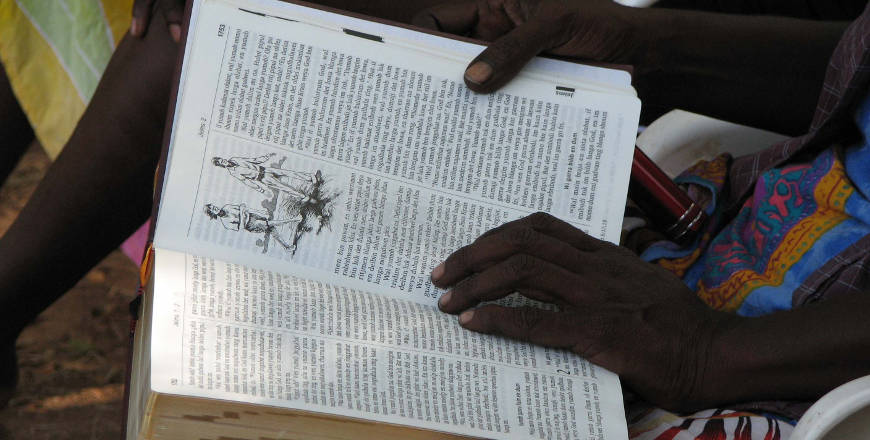Bible translation is not as simple as it might first appear. There I not always a word-for-word match. For example, in the Manga Buang language spoken buy a group of Papua New Guinean (PNG) people there are twelve words for the English word ‘carry’. There is a different word for ‘carry on the head’, for […]
Bible translation is not as simple as it might first appear. There I not always a word-for-word match. For example, in the Manga Buang language spoken buy a group of Papua New Guinean (PNG) people there are twelve words for the English word ‘carry’.
There is a different word for ‘carry on the head’, for ‘carry in the mouth or beak’, for ‘carry on the back’, for ‘carry suspended from a pole’ (a pig, for instance), and so on.
On the other hand, sometimes there is no equivalent to an English words, and so translators need to create expressions or phrases that will communicate what English does in a single word. Then there are contextual issues to consider. What does a shepherd or a sheep, or a vineyard mean to a person who lives deep in a PNG jungle?
These were just some of the challenges that translator-in-training Hanna Schulz shared with Lutheran Bible Translators Australia (LBTA) supporters at a fundraising lunch on 4 September. Around 80 guests gathered at St Michael’s Lutheran Church, Hahndorf, South Australia, to learn more about the work of LBTA and to encourage Lutheran translators Margaret Mickan (who was unable to attend the function due to pressing work commitments), Bill and Di Eckermann and Hanna Schulz.
Margaret Mickan is a ‘career translator’, having commenced literary work with LBTA in 1984. Partnering with Wycliffe Bible Translators (WBT), she works among the 30,000 Kriol-speaking indigenous people across northern Australia promoting use of the Kriol Bible, which was completed in 2007.
With the help of LBTA, Bill and Di Eckermann built a house in the PNG village of Bukawa in 1989 and began the task of analysing the language of the 10,000 Bukawa-language speakers centred around Lae. They produced written form of the language and by 2001 they had translated and dedicated the New Testament in the Bukawa language.
After returning to Australia, Bill, who continues to work as a consultant with WBT and LBTA, assisted in the updating of the Gospel of Mark in Ma’di, one of the languages spoken by Sudanese refugees in Australia.
Hanna Schulz Is currently completing linguistic studies at WBT in Melbourne. Next year she will commence translation work in the field, probably in PNG, where 830 of the world’s 6,909 living languages are spoken.
Dr Tim Fischer, LBTA chair, urged LCA members to continue to support the work of Lutheran translators, which is funded primarily by donations. It can take many years of intense work before there is tangible written evidence of translation work, he said. The process is long and tedious: learning languages from scratch, developing alphabets, translating large sections of the Scriptures, and then teaching people how to read them in their own language.
‘Please don’t forget our translators’, he said. ‘They work hard in conditions that most of us could not endure and often without much encouragement, so that the word of God might come alive in the language of the people they serve. It can be lonely work., They need our ongoing and faithful support.
‘Please pray for them – Hanna, Margaret, Bill – and for all of LBTA’s activities as we continue to pursue our aim of seeing people come to faith in Jesus Christ as they read God’s word in their heart language.’
If you would like to consider the opportunity to donate to Hanna Schulz, who is now serving as a linguist and translation advisor in Papua New Guinea, you are invited to go to https://wycliffe.org.au/member/hanna/
Read more stories about our partner church in Papua New Guinea at https://www.lcamission.org.au/category/stories/international-partners/papua-new-guinea/


0 Comment